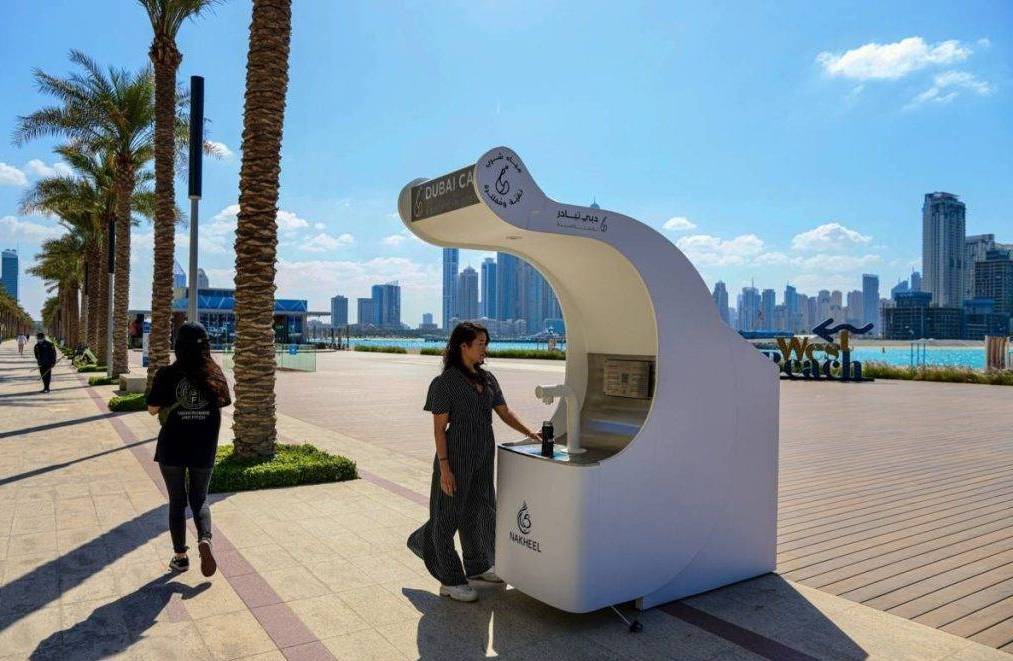Many private companies in Dubai have been inspired by Dubai Can to install water fountains in their offices, reducing single-use plastics in the workplace…reports Asian Lite News
Dubai Can, the citywide sustainability movement launched on 15th February 2022, has successfully reduced the use of an equivalent of more than 7 million 500 ml single-use plastic water bottles in its first year.
The exceptional success of the initiative is reflected in the fact that Dubai Can has been widely adopted in the city, with participation from homes, offices, hotels, schools, and the installation of 50 water fountains in different locations.
Dubai Can has placed water fountains in strategic places across the city, including public parks, beaches, and popular tourist destinations, with the help of its partners and sponsors. The fountains can be found in well-known neighbourhoods such as Kite Beach, Dubai Marina, and Downtown Dubai. Working together with talabat, a leading online food delivery service, Dubai Can has expanded its fountain locations and improved awareness. Fountains were recently added in four additional prominent locations: Hatta, Dubai Sports City, Port Rashid, and Dubai Internet City.
Yousuf Lootah, Acting CEO of Corporate Strategy and Performance sector at Dubai’s Department of Economy and Tourism (DET), said, “In line with the vision of Sheikh Mohammed bin Rashid Al Maktoum, Vice President, Prime Minister and Ruler of Dubai, to make Dubai a leading sustainable destination, the Dubai Can movement has experienced considerable success since its launch one year ago. We are extremely proud of the progress the initiative has made, and we hope that during this year and beyond, the initiative will continue to encourage residents and tourists to adopt greener practices and lifestyle choices contributing to the Dubai Economic Agenda D33’s goal of consolidating Dubai’s status as one of the world’s top three global cities.”
“The success of this initiative could not have been possible without the wholehearted support of our valued city stakeholders and partners, as well as the city’s public-private partnerships that significantly contributed to Dubai’s sustainability strategy. As we strive to achieve all of the city’s sustainability goals and position it as the best city in the world to live in, work and visit, we look forward to the continued success of Dubai Can, particularly in 2023, which has been declared as UAE’s ‘Year of Sustainability,” Lootah added.
The Dubai Can initiative has inspired significant change at both the individual and community level over the past year, extending beyond the installation of fountains. Its objective is to increase awareness of the harmful effects of single-use plastics and promote the use of reusable bottles not only at water fountains but also in homes, hotels, and elsewhere, aiming to change people’s mindsets.
Many private companies in Dubai have been inspired by Dubai Can to install water fountains in their offices, reducing single-use plastics in the workplace. Above all, the movement has encouraged residents and visitors to the UAE to adopt more sustainable behaviours and become conscientious consumers.
The initiative is in line with Dubai’s commitment to achieving the United Nations Sustainable Development Goals (UNSDGs) and becoming a fully sustainable destination, especially since the city is the host of COP28 this year. As part of the UAE’s Year of Sustainability in 2023, the campaign has entered its second year and has become a driving force for the city’s sustainability strategy. The initiative’s momentum seamlessly aligns with the ban on single-use plastic bags, which came into effect on 1st June, 2022, demonstrating the UAE’s commitment to environmental protection and waste reduction.
Dubai Can’s environmental impact on the city remains significant, and the initiative is poised to continue its positive influence for years to come. All water stations throughout the city adhere to the highest hygiene standards and comply strictly with municipal, healthcare, and federal regulations. The stations provide clean and safe drinking water, which is tested in accordance with DEWA, GCC, and World Health Organisation standards.

Leave a Reply